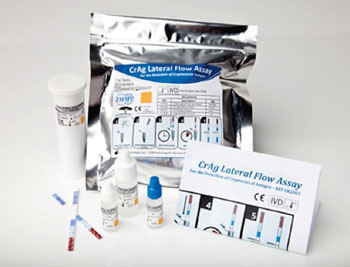Lateral Flow Immunoassay Validated for Detection of Cryptococcal Antigen
|
By LabMedica International staff writers Posted on 23 Feb 2015 |

Image: The CrAg lateral flow assay to detect cryptococcal antigens (Photo courtesy of Immuno-Mycologics).
Cryptococcosis is an important and potentially lethal opportunistic infection in immunocompromised patients, especially in human immunodeficiency virus (HIV) infected and organ transplant patients.
The incidence of the infection in non-HIV immunocompromised patients caused by Cryptococcus neoformans and in immunocompetent patients caused by C. gattii has increased in developed countries.
Medical microbiologists at the Johns Hopkins University School of Medicine (Baltimore, MD, USA) compared a lateral flow immunoassay (LFA) to a currently used enzyme immunoassay for detection of cryptococcal antigen in 396 sera and 651 cerebrospinal fluid specimens. The cryptococcal antigen detection was performed in retrospective and prospective sera and CSF specimens collected from March 2010 to August 2012 in patients suspected of cryptococcal infection from the Johns Hopkins Hospital, an academic tertiary care hospital.
The newly developed CrAg lateral flow immunoassay (LFA) (Immuno-Mycologics [IMMY]; Norman, OK, USA) offers a rapid and easy alternative detection platform. The LFA assay detects glucuronoxylomannan (GXM), the major polysaccharide component of the cryptococcal capsule. It is a dipstick sandwich immunochromatographic assay that captures the GXM by gold-conjugated anti-Cryptococcus monoclonal antibodies incorporated on the dipstick membrane. This test was compared with an enzyme immunoassay (EIA) from Meridian Premier (Meridian Biosciences; Cincinnati, OH, USA).
The scientists found 97% concordance between the two assays. The LFA assay detected an additional 22 positives. Overall, the LFA had sensitivity of 100% and specificity of 99.6% for the diagnosis of cryptococcosis. Although reading the LFA result can be subjective, they found that the visible lines suggestive of positive results are usually easy to determine. Easy readability combined with additional advantages of rapid turn-around time of 10-minutes ease of performance, requiring little technical expertise, and limited cost make the LFA an attractive tool for routine laboratory use.
The authors concluded that the IMMY LFA showed better sensitivity in detecting C. neoformans antigen in serum and CSF specimens compared to an EIA method in current use. Because of the enhanced sensitivity, users must be aware of the possibility of false positive results in patients with low clinical suspicion of cryptococcal infection. The LFA is rapid, accurate, easy to perform, and cost-effective, and thus it is attractive for implementation by clinical laboratories for routine patient care testing. The study was published on January 31, 2015, in the journal Diagnostic Microbiology and Infectious Disease.
Related Links:
Johns Hopkins University School of Medicine
Immuno-Mycologics
Meridian Biosciences
The incidence of the infection in non-HIV immunocompromised patients caused by Cryptococcus neoformans and in immunocompetent patients caused by C. gattii has increased in developed countries.
Medical microbiologists at the Johns Hopkins University School of Medicine (Baltimore, MD, USA) compared a lateral flow immunoassay (LFA) to a currently used enzyme immunoassay for detection of cryptococcal antigen in 396 sera and 651 cerebrospinal fluid specimens. The cryptococcal antigen detection was performed in retrospective and prospective sera and CSF specimens collected from March 2010 to August 2012 in patients suspected of cryptococcal infection from the Johns Hopkins Hospital, an academic tertiary care hospital.
The newly developed CrAg lateral flow immunoassay (LFA) (Immuno-Mycologics [IMMY]; Norman, OK, USA) offers a rapid and easy alternative detection platform. The LFA assay detects glucuronoxylomannan (GXM), the major polysaccharide component of the cryptococcal capsule. It is a dipstick sandwich immunochromatographic assay that captures the GXM by gold-conjugated anti-Cryptococcus monoclonal antibodies incorporated on the dipstick membrane. This test was compared with an enzyme immunoassay (EIA) from Meridian Premier (Meridian Biosciences; Cincinnati, OH, USA).
The scientists found 97% concordance between the two assays. The LFA assay detected an additional 22 positives. Overall, the LFA had sensitivity of 100% and specificity of 99.6% for the diagnosis of cryptococcosis. Although reading the LFA result can be subjective, they found that the visible lines suggestive of positive results are usually easy to determine. Easy readability combined with additional advantages of rapid turn-around time of 10-minutes ease of performance, requiring little technical expertise, and limited cost make the LFA an attractive tool for routine laboratory use.
The authors concluded that the IMMY LFA showed better sensitivity in detecting C. neoformans antigen in serum and CSF specimens compared to an EIA method in current use. Because of the enhanced sensitivity, users must be aware of the possibility of false positive results in patients with low clinical suspicion of cryptococcal infection. The LFA is rapid, accurate, easy to perform, and cost-effective, and thus it is attractive for implementation by clinical laboratories for routine patient care testing. The study was published on January 31, 2015, in the journal Diagnostic Microbiology and Infectious Disease.
Related Links:
Johns Hopkins University School of Medicine
Immuno-Mycologics
Meridian Biosciences
Latest Microbiology News
- Comprehensive Review Identifies Gut Microbiome Signatures Associated With Alzheimer’s Disease
- AI-Powered Platform Enables Rapid Detection of Drug-Resistant C. Auris Pathogens
- New Test Measures How Effectively Antibiotics Kill Bacteria
- New Antimicrobial Stewardship Standards for TB Care to Optimize Diagnostics
- New UTI Diagnosis Method Delivers Antibiotic Resistance Results 24 Hours Earlier
- Breakthroughs in Microbial Analysis to Enhance Disease Prediction
- Blood-Based Diagnostic Method Could Identify Pediatric LRTIs
- Rapid Diagnostic Test Matches Gold Standard for Sepsis Detection
- Rapid POC Tuberculosis Test Provides Results Within 15 Minutes
- Rapid Assay Identifies Bloodstream Infection Pathogens Directly from Patient Samples
- Blood-Based Molecular Signatures to Enable Rapid EPTB Diagnosis
- 15-Minute Blood Test Diagnoses Life-Threatening Infections in Children
- High-Throughput Enteric Panels Detect Multiple GI Bacterial Infections from Single Stool Swab Sample
- Fast Noninvasive Bedside Test Uses Sugar Fingerprint to Detect Fungal Infections
- Rapid Sepsis Diagnostic Device to Enable Personalized Critical Care for ICU Patients
- Microfluidic Platform Assesses Neutrophil Function in Sepsis Patients
Channels
Clinical Chemistry
view channel
New PSA-Based Prognostic Model Improves Prostate Cancer Risk Assessment
Prostate cancer is the second-leading cause of cancer death among American men, and about one in eight will be diagnosed in their lifetime. Screening relies on blood levels of prostate-specific antigen... Read more
Extracellular Vesicles Linked to Heart Failure Risk in CKD Patients
Chronic kidney disease (CKD) affects more than 1 in 7 Americans and is strongly associated with cardiovascular complications, which account for more than half of deaths among people with CKD.... Read moreMolecular Diagnostics
view channel
Abdominal Fluid Testing Can Predict Ovarian Cancer Progression
Ovarian cancer kills more women than any other gynecological cancer, largely because it is usually diagnosed only after it has spread widely within the abdomen. Unlike many other cancers, it does not rely... Read more
POC Test Uses Fingerstick Blood, Serum, Or Plasma Sample to Detect Typhoid Fever
Typhoid fever is an acute febrile illness caused by Salmonella enterica serovar Typhi (S. Typhi) and affects an estimated 11–21 million people globally each year, resulting in approximately 128,000–161,000... Read more
Rapid Testing Panel Simultaneously Detects 15 Drugs of Abuse in Urine Within 21 Minutes
Illicit drug use and excessive use of prescription medicine is growing across the US amid a severe opioid crisis. Although overdose fatalities were reported to have declined by nearly 27% in 2024, many... Read moreHematology
view channel
New Guidelines Aim to Improve AL Amyloidosis Diagnosis
Light chain (AL) amyloidosis is a rare, life-threatening bone marrow disorder in which abnormal amyloid proteins accumulate in organs. Approximately 3,260 people in the United States are diagnosed... Read more
Fast and Easy Test Could Revolutionize Blood Transfusions
Blood transfusions are a cornerstone of modern medicine, yet red blood cells can deteriorate quietly while sitting in cold storage for weeks. Although blood units have a fixed expiration date, cells from... Read more
Automated Hemostasis System Helps Labs of All Sizes Optimize Workflow
High-volume hemostasis sections must sustain rapid turnaround while managing reruns and reflex testing. Manual tube handling and preanalytical checks can strain staff time and increase opportunities for error.... Read more
High-Sensitivity Blood Test Improves Assessment of Clotting Risk in Heart Disease Patients
Blood clotting is essential for preventing bleeding, but even small imbalances can lead to serious conditions such as thrombosis or dangerous hemorrhage. In cardiovascular disease, clinicians often struggle... Read moreImmunology
view channelBlood Test Identifies Lung Cancer Patients Who Can Benefit from Immunotherapy Drug
Small cell lung cancer (SCLC) is an aggressive disease with limited treatment options, and even newly approved immunotherapies do not benefit all patients. While immunotherapy can extend survival for some,... Read more
Whole-Genome Sequencing Approach Identifies Cancer Patients Benefitting From PARP-Inhibitor Treatment
Targeted cancer therapies such as PARP inhibitors can be highly effective, but only for patients whose tumors carry specific DNA repair defects. Identifying these patients accurately remains challenging,... Read more
Ultrasensitive Liquid Biopsy Demonstrates Efficacy in Predicting Immunotherapy Response
Immunotherapy has transformed cancer treatment, but only a small proportion of patients experience lasting benefit, with response rates often remaining between 10% and 20%. Clinicians currently lack reliable... Read morePathology
view channel
Engineered Yeast Cells Enable Rapid Testing of Cancer Immunotherapy
Developing new cancer immunotherapies is a slow, costly, and high-risk process, particularly for CAR T cell treatments that must precisely recognize cancer-specific antigens. Small differences in tumor... Read more
First-Of-Its-Kind Test Identifies Autism Risk at Birth
Autism spectrum disorder is treatable, and extensive research shows that early intervention can significantly improve cognitive, social, and behavioral outcomes. Yet in the United States, the average age... Read moreTechnology
view channel
Robotic Technology Unveiled for Automated Diagnostic Blood Draws
Routine diagnostic blood collection is a high‑volume task that can strain staffing and introduce human‑dependent variability, with downstream implications for sample quality and patient experience.... Read more
ADLM Launches First-of-Its-Kind Data Science Program for Laboratory Medicine Professionals
Clinical laboratories generate billions of test results each year, creating a treasure trove of data with the potential to support more personalized testing, improve operational efficiency, and enhance patient care.... Read moreAptamer Biosensor Technology to Transform Virus Detection
Rapid and reliable virus detection is essential for controlling outbreaks, from seasonal influenza to global pandemics such as COVID-19. Conventional diagnostic methods, including cell culture, antigen... Read more
AI Models Could Predict Pre-Eclampsia and Anemia Earlier Using Routine Blood Tests
Pre-eclampsia and anemia are major contributors to maternal and child mortality worldwide, together accounting for more than half a million deaths each year and leaving millions with long-term health complications.... Read moreIndustry
view channel
WHX Labs in Dubai spotlights leadership skills shaping next-generation laboratories
WHX Labs in Dubai (formerly Medlab Middle East), held at Dubai World Trade Centre (DWTC) from 10–13 February, brings together international experts to discuss the factors redefining laboratory leadership,... Read moreNew Collaboration Brings Automated Mass Spectrometry to Routine Laboratory Testing
Mass spectrometry is a powerful analytical technique that identifies and quantifies molecules based on their mass and electrical charge. Its high selectivity, sensitivity, and accuracy make it indispensable... Read more
AI-Powered Cervical Cancer Test Set for Major Rollout in Latin America
Noul Co., a Korean company specializing in AI-based blood and cancer diagnostics, announced it will supply its intelligence (AI)-based miLab CER cervical cancer diagnostic solution to Mexico under a multi‑year... Read more










 (3) (1).png)





